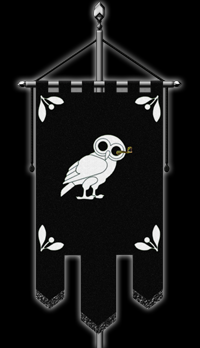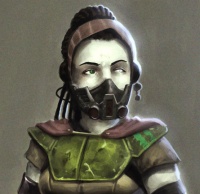Hieros Lokhos ton Taras was the ceremonial name of House Cestus, which translated as "the Sacred Band of Clan Tarentum." This organization, referred to as "The Lokhos" by members internally, maintained a strict ideology of severe loyalty, unending training, and profound scholarship. They were based aboard the VSD Corsair and all inhabitants of Cestus were constituents of the Lokhos, regardless of whether they were Dark Jedi or non-Force users living aboard the Corsair. The group, subsequently, was comprised of elite warriors who served the Tarentum clan summit.
Following the tensions and resulting conflict within the house, Cestus was closed along with its fellow houses Gladius and Tridens, thereby ending the brief but successful existence of the system of the Lokhos in 32 ABY.
History
Formation
 The Cestus banner.
The Cestus banner.
The Hieros Lokhos ton Taras was formed by Quaestor Ronovi Tavisaen and Aedile Ji K'awiil shortly after the Reclamation of Antei and the generally large clan casualties during said military operation. The organization, more specifically, emerged as a direct result of the growing power of House Cestus during the crisis in the Yridia system. As Cestus' rival houses grew politically and socially distant after the Eden City Tragedy, Consul Anshar Kahn Tarentae and Proconsul Maxamillian von Oberst decided to turn to Cestus in order to enact and enforce their will, directly resulting in the imminent structural changes within the house. The minutes of the meeting between the Cestus house summit and Elders follow:
Members Present
Proceedings
- Meeting called to order 2230 military time
- Templar Ronovi Tavisaen's Quaestor Report
- Iterates the need for a reformation of House Cestus to better serve Clan Tarentum as well as to give Cestus a leg up against rival factions within the clan. After a brief discussion council agrees.
- Vai Azexel insists that any reorganization of the house involve a preservation of the archive aboard the Corsair as well as a focus on study of warfare.
- Ji K'awiil recommends the inclusion of non-Force using members of the House in order to bolster numbers and encourage cooperativeness; seconded and passed 6 in favor, 2 opposed.
Pontifex Saitou Tarentae's Elder Report
- Saitou explains the necessity that whatever reorganization is implemented, the overall objective must be to serve the interests of the clan summit both domestically in Yridia and abroad.
- Presents a report on the malleability of Cestus' current organization, as well as the likely percentages of members willing to adhere to the new changes. Violent action against dissenters is recommended and, after a brief discussion, approved by the council.
- A series of ranks and obligations is proposed by Saitou Tarentae. Discussion ensues and ranks are approved (with slight changes) 7 in favor, 1 opposed.
Dark Jedi Knight Ji K'awiil's Aedile Report
- Provides a schedule for the implementation of changes, already approved by the house summit.
- Reviews the roles each rank will play within the Lokhos and recommends various changes. After a discussion the motion is voted down 3 in favor, 5 opposed.
- Meeting adjourned at 200 military time
Dissolution
Following the Rite of Supremacy in 32 ABY, members of the Lokhos began to clash with one another, including members of the Cestus house summit. When Cestus's old banner was discovered buried within the old Cestus Complex, the Ethnarc and Phylarch, Ji K'awiil and Windos Helkin Tarentae, began a conflict that resulted in the division of the Lokhos into two factions. While the faction under the Phylarch was at first successful in seizing control of the VSD Corsair, members of the Ethnarc's faction were quick to challenge such fortifications. Ji K'awiil, along with Eklektor Raimi Mistwalker, were able to travel deep into the complex and discover the banner - only to soon confront and duel Windos there. It was not until Tarentum's clan summit and naval fleets intervened, and Windos was killed by Saitou Tarentae; that stability temporarily returned to the house.
After taking the events of the conflict from then on known as the "Rift" into account, the clan summit decided that they could not let Cestus or its fellow houses linger any longer in clan politics. All three houses were subsequently closed and replaced with houses Kaerner and Reinthaler, and with the closure of Cestus came the dissolution of the Hieros Lokhos ton Taras.
Induction
While it is true that all Cestus personnel were members of the Lokhos, regardless of Force sensitivity; incoming Force-sensitive members of the house were required to wait until they reached the rank of Acolyte before they performed the induction ceremony and were allowed to formally participate in the unit.
The induction ceremony for Dark Jedi members of the Lokhos typically took place in a darkly lit chamber deep in the bowels of the Corsair. There, the inductee was supervised by the Lokhos' Eklektor in Heliaia. Under the gaze of Cestus' prized banner, the recruit was required to perform a blood-letting ritual, wherein (s)he used a ceremonial dagger to open the veins of the forearm and allow his/her blood to fill a small clay vessel. Once the vase was filled, it was plugged and stored by the Eklektor in Heliaia in the auditorium where the banner typically sat, alongside the vases filled with the blood of every other member of the Hieros Lokhos. The inductee was then awarded his/her rank-distinguishing sash and was promoted to the rank of Akolyth.
While the banner has been removed from the Corsair and remains a treasured artifact, it is unclear what has become of the vases of blood. Many say that they are still stored in honor of the many members of the Lokhos, but mum is the word when it comes to the real story.
Honorary Titles
Honorary titles of the Hieros Lokhos were given to each member of the incumbent house summit - they were known as the Ethnarc, Phylarch, and Eklektor. While they were not official positions or ranks, the titles symbolized the roles and duties that each house summit member carried out. Any current house summit member held his or her title in Heliaia - any and all former house summit members, despite no longer running the house, retained their titles as an honor. As a mark of their positions, the Ethnarc, Phylarch, and Eklektor in Heliaia wore white sashes to signify their importance in Lokhos operations.
 Ronovi Tavisaen, the first Ethnarc and one of the founders of the Hieros Lokhos.
Ronovi Tavisaen, the first Ethnarc and one of the founders of the Hieros Lokhos.
Ethnarc
The Ethnarc was the ceremonial term for the house's Quaestor. The incumbent Ethnarc was referred to as the Ethnarc in Heliaia while past office-holders were simply referred to as 'Ethnarc'. The term Ethnarc was used later in Tarentum politics to define the non-Jedi figurehead in charge of the Yridian Kratocracy.
Fulfilling the traditional duties of the Quaestor, the Ethnarc oversaw the administration of the entire Hieros Lokhos, ensuring that the Phylarch and Eklektor performed their tasks to the high standards demanded by the Hieros Lokhos. The Hippoti administrators throughout the Corsair reported directly to the Ethnarc as well as to the Komturei. This signified that the Ethnarc accepted and honored advice from the Komturei, as they had been regarded as enduring, wise members of House Cestus and subsequently Clan Tarentum. The Ethnarc, however, continually had the final say concerning missions and operations - the only ones who could counter his/her decisions were the members of the clan summit.
As overseer of the Lokhos, the Ethnarc also took on the judicial responsibilities. Laziness, idiocy, and betrayal of fellowship were all serious crimes against the Lokhos deserving severe punishment, according to the policies of the Komturei. As such, the Ethnarc maintained the role of Inquisitor when dealing with those who had failed to uphold the values of House Cestus and the Lokhos. (S)he also managed all interrogation methods concerning prisoners held on the Corsair, the Phylarch being the only one to witness his/her treatment of each criminal.
Phylarch
 Ji K'awiil, the first Phylarch, second Ethnarc, and one of the founders of the Hieros Lokhos.
Ji K'awiil, the first Phylarch, second Ethnarc, and one of the founders of the Hieros Lokhos.
The Phylarch was the ceremonial term for the house's Aedile. The incumbent Phylarch was referred to as the Phylarch in Heliaia while past office-holders were simply referred to as 'Phylarch'.
Fulfilling the traditional duties of the Aedile, the Phylarch oversaw the training that the Phthians provided for the Hippoti and Akolyths. (S)he set forth the policies and methods used to drill the lower ranks, as well as carry out any restrictions or modifications to said methods if necessary. All Phthians were directly answerable to the Phylarch, as (s)he was their commander and supervised all of the missions that they participated in. Subsequently, (s)he also could be considered the head of Cestus security, supervising all Hippoti who had been assigned to guard or officer positions around the Corsair.
Although the Phylarch could be considered a more hands-on leader than his/her higher-ups were, every action (s)he observed and committed to were to be reported directly to the Ethnarc. Should the Ethnarc have no longer been suited for the Quaestor position - whether or not (s)he realized it - the Phylarch was obligated to take on the Ethnarc's duties until a more direct form of action could be taken. In the event that the Ethnarc had to be forcibly removed from the position, the Phylarch would act as an ambassador and was responsible for alerting the clan summit as well as the Komturei about the situation.
 Adien Falaut, the first Eklektor and one of the founders of the Hieros Lokhos.
Adien Falaut, the first Eklektor and one of the founders of the Hieros Lokhos.
Eklektor
The Eklektor was the ceremonial term for the house's Rollmaster. The incumbent Eklektor was referred to as the Eklektor in Heliaia while past office-holders were simply referred to as 'Eklektor.'
Fulfilling the traditional duties of the Rollmaster, the Eklektor monitored inductions as well as ensured that Hippoti were keeping the Akolyths busy. At the same time, (s)he was responsible for mentoring newcomers in Cestus so that they would adapt to the environment of the house until they reached the rank of Acolyte. The Eklektor was also in charge of archiving and maintaining Cestus's library, updating all files whether through the Holonet or through hand-written documents. (S)he continually kept track of artifacts, meetings, and past missions for reference and safekeeping.
The Eklektor had many assistants in his/her service, both Dark Jedi and non-Force sensitives. They were the librarians of House Cestus, maintaining hardcopy files as well as helping the Eklektor protect and improve the house archives. They also served the Eklektor as advisors as well as messengers, taking care of many newcomers' questions and complaints without having to pester the Eklektor with too much consulting. While these assistants were casually called 'Assistant Eklektors,' normally only one assistant at a time officially held the title, if any held it at all.
Ranks
Ranks of the Hieros Lokhos were official positions with specific roles and duties. If the Lokhos member in question was part of the Dark Jedi Brotherhood, he or she would possibly change rank in the Lokhos when he or she was promoted to a specific rank in the Brotherhood. Non-Jedi members, on the other hand, normally stayed in a specific rank permanently, unless they showed an unnatural amount of valor or devotion to the Hieros Lokhos.
Each rank was responsible for certain tasks either on the Corsair or on Cestus missions, be it cleaning the kitchens as an Akolyth or working as a general to the Lokhos as a Komtur. Whether or not one was taught or one was the teacher all depended on the rank - and on the progress he/she made within the Lokhos.
Akolyth
The Akolyths were any and all members of the Hieros Lokhos who were ranked Acolyte or Protector.
Basically, Akolyths were the grunts of the Lokhos. They were responsible for carrying out basic tasks around the Corsair, which included cleaning, cooking, and maintaining the armory. For their training, Akolyths were placed in groups, each overseen by one Hippotis, in order for them to progress more quickly and efficiently in rank. Members at this particular rank were normally the ones that higher-ups were advised to seek out as potential apprentices, so that the Akolyth in question would be recognized for his/her work. As a mark of their position, Akolyths wore green sashes to signify their beginning steps in Lokhos operations.
Hippotis
The Hippoti were any and all members of the Hieros Lokhos who were ranked Guardian, Jedi Hunter, or Dark Jedi Knight.
The defensive part of the unit, Hippoti were the main security forces around the Corsair. They were known as the guards or protectors of Cestus, even acting as a police force should the need for one have arisen. At the same time, Hippoti were responsible for supervising Akolyths until they, too, became Hippoti. As a mark of their position, Hippoti wore bronze sashes to signify their duty to defend the Lokhos throughout all of its operations.
Phthian
The Phthians were any and all members of the Hieros Lokhos who were ranked Equite 1 or Equite 2.
Phthians were the aristocrats as well as the shock troopers of the Lokhos. The Phthians got to be pampered by the Akolyths, but despite receiving luxurious comfort, they were expected to lead by example, as they were in charge of all training and combat exercises as ordered by the Phylarch. The Phthians were also the primary offensive troops of the Lokhos, participating in combat operations if needed. The Phthians trained themselves physically and mentally to an almost zealous degree, demanding a similar performance from the lower ranked Hippoti and Akolyths under their charge. As a mark of their position, Phthians wore orange sashes to signify their dedication to carrying out all of the Lokhos' operations.
Komtur
The Komturei were any and all members of the Hieros Lokhos who were ranked Equite 3 and above. The term Komturei was used later in Tarentum politics to describe the small, elite group of advisors to the Ethnarc of the Yridian Kratocracy.
Komturei had distinguished themselves in the Lokhos as the most qualified mentors, scholars, and generals that House Cestus had to offer. They were responsible for dictating military policies as well as micromanaging various operations, but they also were busied with organizing logistics and leading during warfare. The Komturei, however, were not as hands-on or as close in contact as those in other ranks of the Lokhos. Still, they played a vital role behind the scenes - teaching, leading, and remaining reclusive in their own private studies. Komturei typically spent a great deal of time in the library and their drive to study was matched only by the religious training regimen of the Phthians. The Komturei were subsequently the only ranked members who were directly in communication with the house summit, contributing to the various meetings and discussions of house development.
As a mark of their position, Komturei wore amber sashes to signify their many years of service to the Lokhos, to Cestus, to Tarentum, and to the Brotherhood as a whole.
The Nightwraiths, while technically a part of the Hieros Lokhos, performed as if they were a separate unit. Only the strongest and most skilled of the Lokhos were assigned to the elite battle team, and as a result, every Nightwraith was a Dark Jedi. The Nightwraiths worked as the primary espionage/commando unit of the Lokhos, and their involvement with the Clan Tarentum I Corps division had given them experience as an intelligence unit as well. They were normally the first members to be included in Lokhos operations, with Phthians being deployed if the Nightwraiths required back-up support and artillery.
Leaders of the Hieros Lokhos
Ethnarcs
Phylarchs